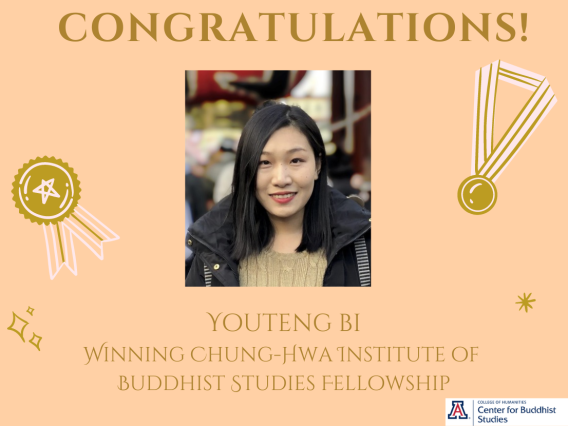
Congratulations to Youteng Bi, a PhD candidate from the Department of East Asian Studies, for winning a fellowship for graduate students by the Chung-Hwa Institute of Buddhist Studies for her dissertation project, titled “Reading As the Path Toward Enlightenment: Ouyi Zhixu’s Reorganization of the Buddhist Canon In the 17th Century China.”
Her Dissertation delves into the multi-faceted nature of canonical textual practices, including reading, expositing, and cataloging. It reveals how reading the Buddhist canon became constructed as a necessary approach toward enlightenment in 17th-century China. In this dissertation, she studies the eminent monk Ouyi Zhixu 藕益智旭 (1599–1655)’s textual practices, including reading, expositing, and reorganization of the Buddhist Canon in his essential work, Yuezang Zhijin 閱藏知津 (Reading the Buddhist Canon to Know the Path), an annotated catalog of an imagined canon by exploring the context of the Buddhist revival in the Late Ming, wherein the work was composed, the process of Ouyi’s canon reading, and the content and structure of Yuezang Zhijin.
She incorporates methodologies including the history of printing, the history of books and reading, the study of Chinese Buddhist canons and catalogs, the study of editions, ritual study, and philosophical study. By implementing these methods, she argues that the literati’s promotion of reading among common people in the late 16th century extended to the Buddhist sphere, represented by the carving of Jiaxing Canon, and attempts to compose annotated catalogs to reconstruct the canon to facilitate reading. Furthermore, the principle of organizing the canon revolved around the issue of reading in the projects mentioned above. This was because, as a form of religious reading, canon reading in the late 16th century was carried out by common people more for devotional purposes rather than reading and comprehending the doctrine. Yuezang Zhijin, therefore, continued this trend of remaking the canon and promoting reading practices derived from the 16th century. However, Ouyi’s textual practices were essentially religious, significantly different from his time's literati. Besides emphasizing comprehending doctrines within the scriptures, Ouyi also implemented a system of rituals, including vowing and lots-drawing, during his textual practices, which showcases the complicated nature and diversity of textual practices in Chinese religious history.

